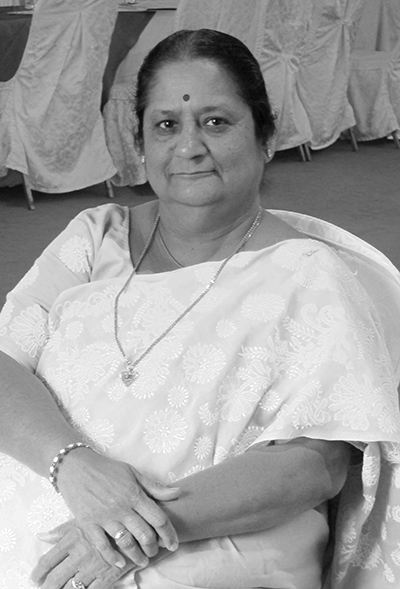OBITUARY
Vasantha Muthuswamy — the only Asthavadhani I know
Mala Ramanathan
Published online first on February 27, 2023. DOI:10.20529/IJME.2023.020
As I write down my thoughts about Dr Vasantha Muthuswamy, “Vasantha Madam” to so many of us, I remember being surprised that each meeting revealed a new facet of her amazing range of skills. A woman of such substance, that so many of us looked up to her as a role model. Not a role model up on a pedestal, but one which you can relate to.
I first met her during the first National Bioethics Conference (NBC) organised by the Indian Journal of Medical Ethics (IJME) in 2005. She was a star speaker, delivering a plenary address on behalf of the Indian Council of Medical Research (ICMR), while we were young rapporteurs for the whole conference. She joked about the height of the podium, and how she would need a stool to stand on to be visible. We scrounged around for a stool, but I was worried that she would fall off if she moved about while speaking. She reassured me that she was used to standing on stools to give talks as most podiums did not accommodate shorter speakers! Later, she chaired another plenary at the second NBC at the National Institute of Mental Health and Neurosciences, Bengaluru, in December 2007. At the third NBC, in New Delhi, in 2010, IJME had honoured her for her significant contributions to the building of the Bioethics movement in India [https://doi.org/10.20529/IJME.2011.006].
Dr Vasantha Muthuswamy continued to be a torchbearer, expanding the bioethics community and discourse in India. I would meet her at various bioethics events around the country and learned that her diminutive size hid her magnificent stature and multiple talents. Yet, you could call her whenever you needed answers to queries that usually confront ethics committee members. She would answer your phone calls without any airs. She could talk about the best way to make suji halwa and when to add ghee; and simultaneously answer questions about the available ethical guidance to manage a complex intervention involving ayurvedic medications as adjunct therapy, yoga and allopathic medication. She was a member of the IJME Editorial Board and was always available to all of us at the journal to help identify specialists on emerging ethical challenges, to review, or step in whenever we needed her for any suitable role at the biennial NBCs. Each of us at IJME felt an individual connect with her over and above her professional roles.
She started her career at ICMR at the Toxaemia Research Unit, Vani Vilas Hospital, Bengaluru, then moved to the Institute for Research in Reproduction (IRR), Mumbai (now the National Institute for Research in Reproductive and Child Health), after completing her undergraduate medical training at the RG Kar Medical College, Kolkata and her post graduate degree in Obstetrics and Gynaecology from the Institute of Obstetrics and Gynaecology, Chennai. Subsequently, she moved to the ICMR headquarters in New Delhi by 1982. She worked under the chairmanship of Justice Venkatachaliah as part of the Central Ethics Committee on Human Research (CECHR) to develop the first Biomedical Ethics Guidelines of ICMR in 2000. She was also part of the group contributing to its subsequent revision in 2006. She chaired the committee that developed the most recent ICMR guidelines of 2017 that forms the backbone of ethics review regulation in the country.
Dr Vasantha was indefatigable in her efforts to push for the ICMR guidelines to be applied across the country, right until the Covid-19 lock down. She travelled, unmindful of her own comfort, to institutions all over India, from large well-endowed national institutions with established Ethics Committees to district-level medical colleges setting up their first Ethics Committees. She tirelessly explained the ICMR 2017 guidelines to all concerned. I am glad that she saw, in her life time, the ICMR guidelines gain regulatory status through the New Drugs and Clinical Trials Rules, 2019. Even during the pandemic, she gave innumerable online lectures, and participated in review processes whenever her health and treatment permitted.
She knew from her extensive work with ethics committees in India, and from the various ICMR surveys, that a very significant proportion of health and clinical research studies in India were not necessarily drug-related clinical trials. She was convinced of the necessity to regulate such research involving vulnerable human subjects in the country, due to the absence of ethical scrutiny of such studies. Even as President of the Federation of Ethics Review Committees of India (FERCI), she dedicated herself to streamlining the functioning of Ethics Committees in India, through review and accreditation. Such was the steely core, beneath the soft spoken woman, that strengthened her drive to give the human subjects research guidelines a regulatory position.
Her achievements, tremendous as they were, sat lightly on her shoulders. Her core values prevailed even as she sought treatment for her health condition. She refused to bypass other patients equally deserving of the excellent care provided at a leading healthcare centre, and waited patiently for her turn, in spite of all the persuasion of her distressed friends and colleagues. It took tremendous courage of conviction not only to facilitate the drafting of the various bioethics guidance documents, but to live up to the moral values enshrined in them, even while suffering the most distressing of health conditions. We could not have had a better role model. Go gently into the light, Vasantha Madam, you leave behind a tremendous legacy, both institutional and individual; one which we, who follow in your wake, hope to emulate with even a modicum of the grace you demonstrated in your life and in your death.